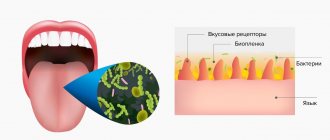Bad breath, which can become a constant companion of a person, can ruin relationships with others and reduce self-esteem. This condition is called halitosis, or halitosis. It is not an independent disease, but is one of the important symptoms of pathologies of the oral cavity and internal organs. You can drown out the stench with mints, spray or chewing gum, but this will not get rid of the problem. We need comprehensive diagnostic measures and subsequent elimination of the causes of halitosis.
Why does there be an unpleasant odor?
The oral cavity is the beginning of the digestive tract. It contains many bacteria; saliva contains enzymes that can break down carbohydrates. Therefore, after waking up, all people have bad breath. But this condition is not considered a pathology; it is enough to brush your teeth for the smell to disappear.
A persistent unpleasant aroma appears after eating dishes with garlic, onions, and some spices. When alcohol is abused, the sour stench persists for a day or more, which is associated with the metabolism of ethyl alcohol in the liver and the release of its vapors through the lungs.
A large number of unpleasant aromas accompany diseases that affect metabolism. In patients with diabetes who do not follow a diet or use insulin incorrectly, when ketone bodies accumulate in the blood, the smell of acetone appears on their breath. People suffering from kidney failure will repel those around them with the unpleasant aroma of urea, which the kidneys cannot remove from the body.
Common causes in adults are pathologies of the digestive tract. Halitosis is caused by:
- gastritis with high acidity;
- stomach ulcer, duodenal ulcer;
- cardiac sphincter insufficiency;
- esophageal diverticula;
- malignant tumors of the stomach or esophagus.
Respiratory diseases can also cause an unpleasant odor. Air from the lungs passes through the oropharynx, so it can partially leave the body through the mouth. It smells unpleasant with purulent diseases of the sinuses, chronic runny nose or tonsillitis.
What diseases cause bad breath?
Trying to diagnose yourself is a thankless task; the range of diseases that can manifest themselves through bad breath is too wide.
Dental diseases
This is the first thing that comes to the mind of a person who has once discovered a problem. Indeed, the most common cause of a pungent odor is caries. Food debris accumulates in carious cavities and pathogenic bacteria multiply. Inflammation of the soft tissues of the oral cavity will also be a real gift for such microorganisms:
- gingivitis;
- periodontal disease;
- periodontitis.
Those patients who periodically turn to dentists for teeth cleaning know that removing tartar is always accompanied by an unpleasant odor. The rest do not even suspect that entire colonies of bacteria accumulate in the interdental space.
Harmless, at first glance, plaque slowly but surely turns into tartar, which not only causes an undesirable odor, but also creates periodontal pockets. Gradually going deeper, they expose the roots of the teeth. The teeth themselves become loose and subsequently fall out.
To avoid such a scenario, preventive visits to the dentist should become the norm for every patient. And if you have bad breath, you should not postpone your visit to the dental center for more than a few days. If the doctor does not identify problems with teeth and gums, you will have to look for the cause of halitosis from other specialists.
Diabetes
If the teeth are healthy and the breath smells of acetone, the therapist will immediately refer the patient to an endocrinologist, because this is how diabetes mellitus usually begins to manifest itself. With this pathology, glucose does not enter the body's cells, but accumulates in the blood. The cells, in turn, feel energy hunger. To saturate them, the body rapidly breaks down fats and proteins, which leads to the production of acetone.
The diagnosis can be confirmed by a urine and blood test, which will certainly contain ketone bodies. Ignoring the smell of acetone on your breath can lead to hyperglycemic coma and even death.
Liver and gallbladder diseases
Gallstones, cholecystitis and bile stagnation make themselves felt by the appearance of bad breath. Usually in this case the smell is not so strong that the patient pays attention to it. He is much more worried about the bitter, unpleasant taste in his mouth, as well as pain in the right hypochondrium, often radiating to the back.
However, the “liver” smell is easy to recognize: it is sweetish, and somewhat reminiscent of the smell of raw liver. When it becomes putrid, the organ has ceased to cope with its functions, and it is likely that the patient will be diagnosed with hepatitis or cirrhosis. To establish a diagnosis, an ultrasound must be performed and a blood test taken for bilirubin and liver enzymes.
Thyroid
An unpleasant odor may also appear due to disturbances in the functioning of the thyroid gland. An increase or decrease in its functions is observed in 2% of the population of our planet. Diseases of this organ begin almost imperceptibly and proceed without any special manifestations. One of the first alarm bells is the smell of iodine coming from your mouth.
Kidney diseases
You can suspect problems with the kidneys by bad breath, which clearly resembles urine. In this case, we can talk about a violation of protein metabolism. Metabolism is disrupted, and the end products of protein breakdown are excreted through the lungs. The ammonia odor is intense, although no toxins are detected in the exhaled air.
Gastrointestinal problems
Accompanied by heartburn, belching and pain in the epigastric region, an unpleasant sour breath almost always indicates diseases such as gastritis or a stomach ulcer. Problems with the intestines are also possible, for example, dysbiosis (disturbance of the microflora), which often occurs while taking antibiotics and other medications.
Pathology of the respiratory system
A putrid odor can be caused by diseases of the respiratory system such as:
- enlarged adenoids;
- tonsillitis;
- chronic sinusitis;
- angina;
- sinus inflammation;
- bronchitis;
- purulent otitis;
- pneumonia.
An unpleasant odor indicates that an inflammatory process is in full swing in the body, which requires urgent medical attention.
Important! Regardless of the cause of bad breath, once the disease that caused the symptom is completely cured, it completely disappears. This is why it is so important to determine the cause of halitosis, and not try to mask the problem with air fresheners.
Dental causes of halitosis
When bad breath appears, disease of the teeth or gums is first suspected. Bacteria use leftover food in the mouth to feed themselves. If you brush your teeth incorrectly or completely abandon this procedure, a large amount of plaque accumulates in your mouth. Its rotting causes a repulsive odor. If plaque is not removed for a long time, dense tartar forms, and the stench persists for a long time.
Caries and tooth decay can also cause an unpleasant odor. These are areas where large numbers of microbes accumulate. The breath of people who do not remove decayed tooth roots in a timely manner has a strong smell. A stench can occur when wearing braces, dental plates, dentures, under which food debris accumulates. Any foreign body in the mouth requires additional cleansing.
The condition of the oral cavity is affected by the production of saliva. In some diseases it is not liquid enough. Dryness of the oral mucosa occurs, self-cleaning processes are disrupted and bacterial growth is activated. A similar mechanism works in hot weather or when playing sports, if you actively breathe through your mouth.
Smoking also contributes to the appearance of halitosis. Components of tobacco smoke settle on the teeth and combine with soft plaque. Dry mouth contributes to changes in the composition of saliva and an increase in its viscosity. You can get rid of the smell only by defeating a bad habit.
Treatment methods
How halitosis is treated depends directly on the cause that caused the unpleasant odor. The dentist will provide a comprehensive solution to the oral problems that could cause this problem. But if the treatment does not help, he will refer you to another specialist for further examination.
Professional oral hygiene This procedure involves removing plaque and tartar, including those located deep under the gums. An integrated approach is used, i.e. Several devices are used at once: ultrasonic, air-abrasive Air Flow, if necessary, manual cleaning is carried out. Finally, the enamel is polished and coated with a protective fluoride varnish.
Price:
3000 rubles more about the solution
Treatment of caries If there is caries on the teeth, the inflamed tissue will be removed, the resulting cavity will be treated with antiseptic, followed by filling using composite materials. When the carious process penetrates into the deep layers, it is advisable to use medicated pads containing calcium hydroxide - this way additional protection is created to preserve the dental nerve.
Price:
3000 rubles more about the solution
What do different types of smell mean?
Unpleasant odors are caused by several types of volatile compounds produced by anaerobic bacteria. They use food debris on the tongue, between teeth and in carious cavities as a nutrient medium. Depending on the predominant compound, the character of the odor changes. Some of them suggest the pathology that caused halitosis:
- sour aroma – stomach diseases, gastritis or ulcers;
- feces, rotten cabbage - oral pathology, caries;
- smell of urine - kidney failure;
- the smell of ammonia or rotting apples – diabetes;
- rot, rotten meat - esophageal diverticulum.
You can find additional symptoms that will accurately indicate the cause of halitosis. If you have stomach pathology, you will experience pain between snacks. Diabetes mellitus is accompanied by excessive urination, dry mouth and thirst. Caries may not appear for a long time, but in advanced forms toothache appears.
Given the variety of causes, diagnosis, prevention and treatment of halitosis can be performed by doctors of different specialties. You need to see a dentist to get rid of dental diseases, but in other cases you will need to consult an endocrinologist, therapist or nephrologist.
Prevention
Preventive measures will help reduce the risk of ammonia odor. To ensure that the breath of adults and children always remains fresh, it is recommended:
- Mandatory daily hygienic brushing of teeth and tongue using toothpaste and mouth rinse.
- Regular and nutritious balanced meals. Eat food often, but in small portions. Avoid long (more than 6 hours) breaks in eating.
- Abundant drinking regime. Water is life. Try to avoid sweet and carbonated drinks, excessive consumption of coffee and black tea, especially in childhood. It is better to drink plain water, natural compotes and fruit drinks with low sugar content, and herbal teas.
- Regular medical examination and treatment of diseases of internal organs. It is important for children not to skip preventive medical examinations, even if there are no obvious complaints. A young child will not tell you much about how they are feeling, so clinical observation is extremely important.
- Rejection of bad habits. Alcohol, smoking, and taking drugs increase bad breath and make your breath smelly. Substances that enter the body through smoking and drinking alcohol disrupt metabolism and provoke various diseases.
Bad breath is a symptom that can be easily eliminated; it is important not to miss the dangerous disease hiding behind it. Proper prevention and diagnosis will help maintain health.
Ways to combat unpleasant odor
It is not always possible to independently guess that your breath smells bad. A person does not perceive an unpleasant aroma, so he can judge its appearance by indirect signs. If you have any suspicions, you can use the edge of a spoon to collect plaque from your tongue and smell it. The condition of the saliva is judged by licking the wrist and waiting for it to dry.
You can get rid of an unpleasant odor using traditional methods. At home, a decoction of dill is used to rinse the mouth. At home you can prepare an infusion of medicinal herbs with anti-inflammatory and antibacterial effects:
- chamomile;
- Oak bark;
- sage;
- mint;
- calendula;
- St. John's wort.
At home, a decoction is prepared from a mixture of several herbs to increase effectiveness. The infusion must be highly concentrated to suppress the growth of bacteria and cleanse the oral cavity.
If halitosis is associated with eating foul-smelling ingredients, parsley or celery root will help get rid of it. They block foul odors, and chewing the fibrous structure cleanses the teeth. Observance of a drinking regime relieves halitosis. Clean water cleanses the oral cavity and keeps saliva in a liquid state.
The reason why these methods do not help are pathologies of digestion and metabolism. You can get rid of them at home only under the guidance of a doctor.
A quick way to get rid of the metallic taste in your mouth
It is clear that the unpleasant taste in the mouth will go away after appropriate treatment, but nothing prevents a person from taking steps to get rid of it while treatment is ongoing.
To do this, you can rinse your mouth with lemon juice 2 times a day or simply eat a few slices of lemon for breakfast and dinner. This, by the way, is very beneficial for the kidneys and immune system.
You can put some ginger, cinnamon or cardamom in your mouth throughout the day. Sweet lollipops are a good way to get rid of the iron taste, but if you have bad teeth, it is better not to use this method. A person's diet should include oranges, grapefruits, tangerines and tomatoes. They permanently eliminate the feeling of blood taste in the mouth.
Treatment of digestive diseases
If the oral cavity is sanitized, but the smell remains, you need to contact a gastroenterologist. Before treating halitosis, an examination will be carried out to find the cause of the disorders. Gastritis and ulcers are associated with poor diet, but inflammation of the gastric mucosa is supported by Helicobacter bacteria. You need to get rid of them comprehensively.
To do this, the doctor will prescribe the following groups of medications:
- antacids – to reduce acidity;
- antibiotics – drugs to kill bacteria;
- healing agents - bismuth nitrate or De-nol to restore the mucous membrane.
In the treatment of cardiac sphincter insufficiency, when the opening between the esophagus and the stomach does not close, antacids are also used, supplemented with prokinetics that improve peristalsis. Treatment of digestive diseases is impossible without following a special diet.
How to improve your oral health
Good hygiene helps get rid of bad breath. If the cause is dense tartar, you need to visit the dentist and remove it mechanically. The toothbrush is powerless in this case.
Any dental defects must be treated. Carious cavities are cleaned and filled, and rotting tooth roots are removed. If necessary, prostheses are installed.
To get rid of the smell, you need to change your toothbrush and choose the right toothpaste. The brush should have medium hardness in order to clean the teeth well and not injure the gums. For better oral hygiene, you can buy a special tongue brush. Toothpaste is chosen based on gum sensitivity and related problems. The dentist will help you choose the product.
To thoroughly clean the spaces between teeth, it is not recommended to use wooden toothpicks. A special thread or brush will do the job better. Some threads contain mint fibers that add a pleasant aroma to your breath. And silver ions will stop the proliferation of pathogenic bacteria.
Teeth should be brushed morning and evening. Before going to bed, after hygiene procedures, you do not need to eat. Leftover food at night will become a breeding ground for the proliferation of microorganisms that damage tooth enamel.
Diagnosis of the cause of odor
Rotten breath with healthy teeth occurs in patients with kidney disease and other organs. It happens that bad breath causes Sjögren's syndrome. Therefore, in the absence of diseases of the digestive system, respiratory organs, or diseases of the oral cavity, the search for pathology must be continued. To find out what caused the problem, the doctor must find the cause. To do this, a diagnosis is made, then a treatment plan is developed. Necessary examinations:
- The patient must undergo a urine test.
- It is necessary to undergo an ultrasound examination of internal organs.
- A diagnosis of the lacrimal and salivary glands is prescribed.
- Immune system examinations are recommended.
- A biopsy of problematic organs is prescribed.
Eliminating other causes of unpleasant odor
It is more difficult to get rid of bad breath that is not related to dentistry. If the cause is metabolic disorders, treatment may take a long time. With diabetes, it is important to achieve stable blood glucose levels. Then the ammonia aroma will not bother you. To do this, patients with type 1 disease carefully select the dosage of insulin, and for type 2 diabetes mellitus, they are prescribed a balanced diet and medications to lower blood glucose.
For those with severe kidney problems, the only way to eliminate the smell of urea is to undergo hemodialysis. This is a method of artificial purification of blood plasma, which helps get rid of metabolic products.
Treatment of tonsillitis and respiratory pathologies is carried out with antibiotics. But with the chronic course of the pathology, this is a long process.
The most common cause of bad breath is improper oral care. By visiting the dentist at least once a year and choosing the right brush, paste and floss, you can avoid the onset of halitosis or treat it at an early stage.
Ammonia smell from children's breath
An undesirable symptom can appear not only in an adult, but also in a child. The reasons are also different:
- liver diseases - chronic failure of this organ, hepatitis, cirrhosis;
- disorders of the kidneys;
- a latent form of diabetes mellitus, in which general weakness and nausea appear.
After successful treatment and elimination of the causative factor, the smell of ammonia from the mouth disappears. But often it seems to the child that he is not going anywhere. This condition is called halitophobia. This is already a mental disorder that requires contacting a psychotherapist.










